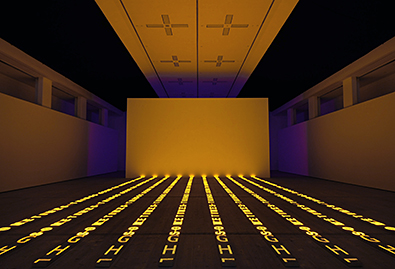“The beginning of the war will be secret”, threatens a huge banner on the side of the red-brick Baltic in Gateshead. It is the creation of American artist Jenny Holzer, whose regular working material includes threats, provocations, manifestoes, truisms and all sorts of sinister insinuations. Holzer has been working with words for more than thirty years, having first announced herself with a series of statements anonymously flyposted on to sides of buildings in New York in the late 1970s: “Protect Me From What I Want”; “Abuse of Power Comes as No Surprise”; “Money Creates Taste”; “Torture is Barbaric”. Inserted into the mainstream of city signage, these mysterious texts were meant to furnish an ambiguous alternative to the messages of the big media, such as the slogans of advertising or the flashing LED displays and scaled-up neon imagery of Times Square. Holzer’s “Truisms”, as she called them, were there to sew doubt and insecurity – if not outright paranoia – in the mind of the beholder.
Holzer has had her detractors over the years, notably the former art critic of Time magazine, Robert Hughes, who once likened her to a seventeenth-century New England matriarch sewing puritanical platitudes on to samplers. But in truth Holzer has always been careful to keep her distance from her own work, in the sense that none of her proclamations are to be taken to express her own beliefs. The multitude of conflicting signals serves as a collective reminder that the world is never as simple as those with something to sell – whether it be a product or a creed – like to make out.
In 1990, Holzer became the first female American artist to represent the United States with a solo exhibition at the Venice Biennale. Now in her sixtieth year, she is one...


